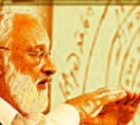
Someone recently told me there are two kinds of people in the world - neurotics who dwell obsessively on the past and those who have the good sense to ignore the past and move forward. Everyone, after all, has skeletons in their closet, and to dwell on past misdeeds seems a sour and pointless activity. For the philosopher Benedict Spinoza, the soul-searching required for repentance is just the irrational impulse of someone steeped in 'suffering' and 'sadness.' For Nietzsche, the one who pursues repentance first suffers a 'fearful paralysis,' then an 'enduring depression' - and eventually a 'shattered nervous system'. 'Ask a psychologist', says Nietzsche:’ he will tell you about the masochistic 'remorse' that repentance always brings’. Many of us know the type - someone depressed and melancholic, wallowing in the past. To such a person we might say, 'get a life; the past is the past; don't dwell on things that you can't change.' If this is the kind of remorse required during the ten days of repentance before Yom Kippur, then perhaps better to follow the philosophers and give up repentance altogether.
Rabbi Akiva says: 'Happy are the people of Israel. Before whom do you render yourself pure? Who purifies you? Your Father in Heaven.' Rabbi Akiva cites a verse from Ezekiel as a proof: 'And I sprinkled upon you purifying waters, and you became pure.' He cites an additional verse from Jeremiah in which G-d is called 'Mikveh Yisrael' - the purifying waters of Israel. 'As a mikveh or ritual bath purifies the impure,' Rabbi Akiva explains, 'so the Holy One purifies Israel.' But why does Rabbi Akiva need to bring two verses? That he suggests an unexpected complexity to t'shuva. When we implore G-d to sprinkle his purifying waters upon us, we are passive; but the metaphor of Mikveh Yisrael implies an activity. True, it is G-d who will purify us, but we have to jump into the mikveh. G-d will do His part, but we have to do ours as well. We look back at Rabbi Akiva's question: 'Before whom do you render yourself pure?' and understand that G-d is certainly an actor in the process, but we are as well making ourselves pure in His presence.
'Great is t'shuva,' says Reish Lakish, 'for deliberate transgressions are accounted meritorious deeds,' as the prophet says, 'when the evil one shall turn from his wickedness and do that which is lawful and right - through them he shall live.' T'shuva transforms ‘willful’ sins into meritorious deeds.' That sounds like a good deal. What I had thought was a dead weight of past misdeeds becomes the source of life - 'through them he shall live!' But 'transgressions’ turned into merits? Is there some kind of divine waving of the magic wand through which the alchemy of bad deeds into good takes place? And if Reish Lakish agrees with Rabbi Akiva, and t'shuva involves human action, then what am I supposed to do to enact such a change?
T'shuva is made possible by a particular conception of time. One version of time is distilled by Shakespeare's Macbeth, for whom the 'tomorrow, and tomorrow, and tomorrow’ of successive meaningless moments leads the 'way to dusty death.' But Macbeth's time is just a sophisticated version of a contemporary notion of time, popularized on t-shirts as - I'll paraphrase it - 'stuff happens'. T'shuva requires a different notion of time, where past, present and future interact - as on Rosh Hashana, when, in the moment of hearing the shofar, we become aware of the Creation, Mount Sinai and the End of Days. The present is no longer part of a chain of unrelated moments, but it is infused by knowledge of a future when the Great Shofar announces the redemption of humanity. The future - our ideal image of it - enters the present and even the past. In the resonances of the shofar on Rosh Hashana we hear eternity as well.
With this consciousness of time, we approach Yom Kippur. As a nation we have an ideal image of our future. Each individual has his own ideal - cultivated and created through repentance and good deeds. Just as the ideal future - the End of Days - invests the present moment with meaning for the people of Israel, so a person's own ideal future connects up with the present as well as the past. Through the image of my own ideal future, I not only mold my present - and here is the power of t'shuva - I recreate my past. This is a long way from the past as an object of my neurotic obsessions weighing me down. Rather, through the backwards glance of t'shuva, my past is transformed. Undoing the relation of cause and effect, it's not my past actions which cause future events, but rather my conception of an unrealized future which recreates the past. In the cause and effect described by Rabbi Joseph Soloveitchik, instead of A leading to B, B leads to A!
But I still might protest: 'I'm ashamed of my past! I did bad things. I need to seek absolution.' But such absolution only comes - remember Rabbi Akiva - through the creative act of repentance and the transformation of my past. It's true that I did bad things, but my motives and actions were not all bad, not irredeemably bad. In fact, my retrospective glance reveals that willful transgressions - my stubbornness, waywardness and selfish desires - are not only consistent with, but they have actually propelled me towards (now I realize it), my ideal future. Those actions I thought had most distanced me from G-d are in fact those that now bring me close. So, willful transgressions are turned into meritorious deeds. Refined by the image of my ideal self, my past misdeeds are seen to shape my present in a way that they now have the power to help me realize my ideal future. I'm not stuck with the depressing either/or of obsessing about my past or abandoning it. Nor need I despair about a past weighing on me - determining who I am now. Moving towards the future, the past recast in its light, my present is transformed. Through the power of t'shuva - no hocus pocus here - sins become good deeds: they are actually the source of a new and transformed life - through them we will live.
 The Morman University Sunday Concert, with ESRA
The Morman University Sunday Concert, with ESRA  Congratulations to ESRA Rehovot on its 10th
Congratulations to ESRA Rehovot on its 10th  THANK YOU!
THANK YOU! Kabbalah For All
Kabbalah For All Haggadot
Haggadot Passover 5767 ...The Holiday of Freedom
Passover 5767 ...The Holiday of Freedom William Kolbrener
William Kolbrener